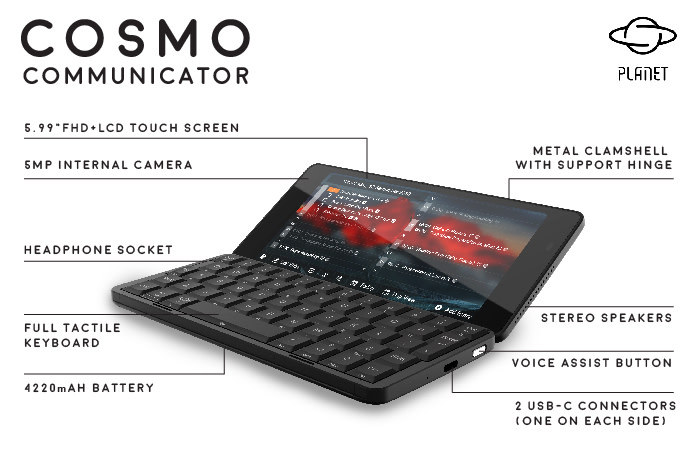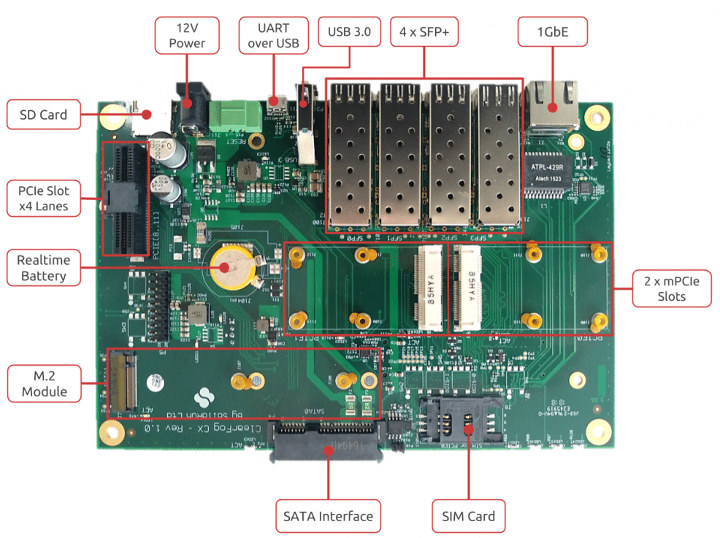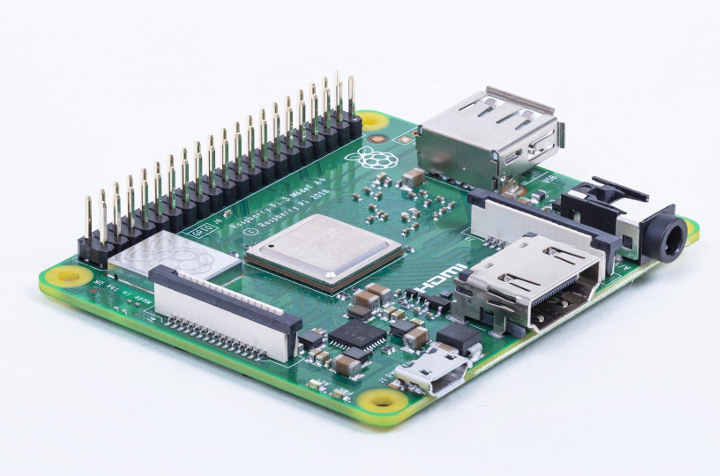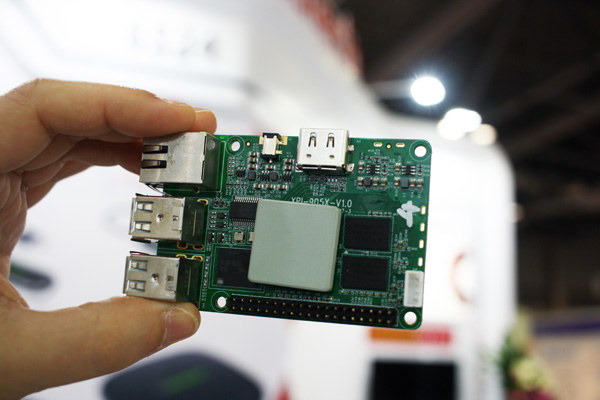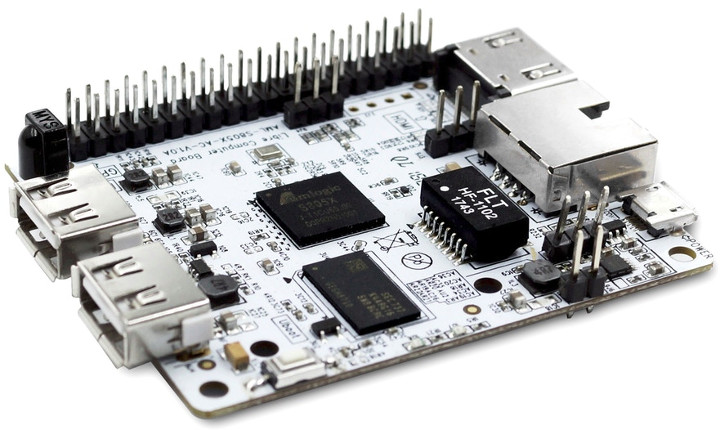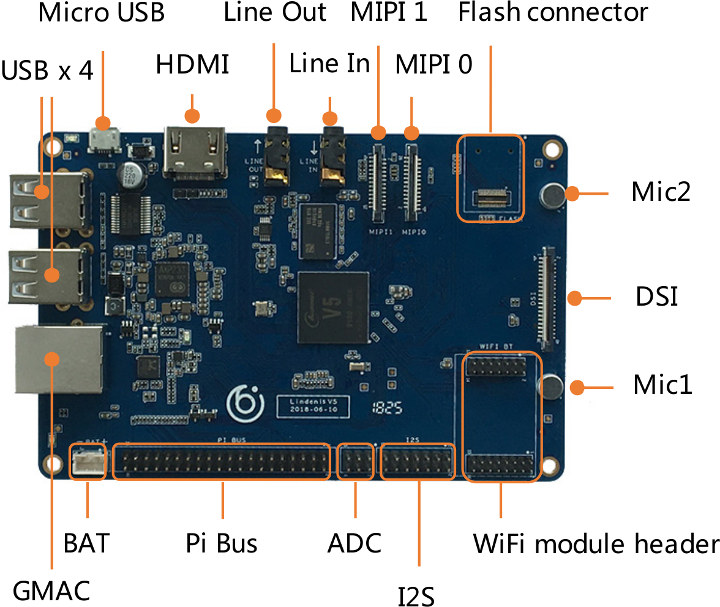In recent years, we’ve started to see Windows 10 mini laptops with 6″ to 8″ display and a foldable keyboard coming to market thanks to products such as GPD Pocket 2 or One Mix 2 Yoga. They offer a full Windows 10 experience in an ultra-small form factor, but you’d still need to carry your phone around with you for things like calls or SMS. Cosmo Communicator offers a similar experience, but instead of relying on Intel processor and Windows, the device comes with a Mediatek P70 mobile processor capable of running Android 9 Pie or Linux distributions merging phone and mini laptop functionalities into a single device. Cosmo Communicator preliminary specifications: SoC – Mediatek P70 octa-core processor with four Arm Cortex A73 cores @ up to 2.0GHz, four Cortex A53 cores @ up to 2.0GHz, Arm Mali G72 MP3 GPU @ 800MHz, and a Dual-core mobile AI processor (APU) […]
Necunos NC_1 is a Pricey Open Source Linux “Phone” without Modem
Several weeks ago, I wrote about the upcoming “Necuno Mobile” phone made by a company called Necunos and running Linux on NXP i.MX6 Quad processor. The phone was supposed to be 100% open source hardware which all software and hardware resources to be made available publicly. There has been progress since then, as well as a name change since Necunos NC_1 is now up for pre-order for 1,199 Euros including VAT and international shipping with delivery promised in March 2019. Necunos NC_1 specifications are said to include: SoC – NXP i.MX 6Quad quad-core Arm Cortex-A9 processor with Vivante GPU System Memory – 1GB RAM Storage – 8 GB storage Display – 5″ touchscreen (attached or detached) Audio – 3.5mm audio jack, built-in microphone, and speaker Connectivity – 2.4 GHz 802.11 b/g/n WiFi Misc – Power, volume, and user programmable buttons USB – 1x micro USB port Battery – 3,500 mAh […]
FOSDEM 2019 Open Source Developers Meeting Schedule
FOSDEM – which stands for Free and Open Source Software Developers’ European Meeting – is a free-to-participate event where developers meet on the first week-end of February to discuss open source software & hardware projects. FOSDEM 2019 will take place on February 2 & 3, and the schedule has already been published with 671 speakers scheduled to speak in 711 events themselves sorted in 62 tracks. Like every year, I’ll create a virtual schedule based on some of the sessions most relevant to this blog in tracks such as open hardware, open media, RISC-V, and hardware enablement tracks. February 2 10:30 – 10:55 – VkRunner: a Vulkan shader test tool by Neil Roberts A presentation of VkRunner which is a tool to help test the compiler in your Vulkan driver using simple high-level scripts. Perhaps the largest part of developing a modern graphics driver revolves around getting the compiler to […]
ClearFog CX 8K ARMADA 8040 Networking Board Complies with COM Express type 7 Specifications
After ClearFog GT 8K earlier this year, SolidRun has now launched another variant of their Marvell ARMADA based ClearFog networking boards: ClearFog CX 8K. The new single board computer features the same ARMADA 8040 quad core Cortex A72 processor as found in the GT 8K model, but complies with COM Express type 7 standard, and takes the company’s CEx7 A8040 module, and in the future any compatible COM Express type 7 module that may be launched by the company, or others. ClearFog CX 8K specifications: Supported COM Module – CEx7 A8040 Marvell ARMADA A8040 quad-core Arm Cortex A72 Memory – Up to 16GB DDR4 DIMM Storage – M.2b & M 2280 SSD, microSD slot, on-module eMMC flash, SATA 3.0 port Networking – 4x SPF+ cages including 2x 10GbE SFP, 1x 1GbE copper (RJ45) USB – 1x USB 3.0 Expansion 2 x mPCIe 1 x PCIe x4 Gen 3.0 I/O – […]
Compact Raspberry Pi 3 Model A+ Launched for $25
The Raspberry Pi 3 B+ is likely the most popular maker board available today at $35, but it just got a little brother – Raspberry Pi 3 Model A+ – that should also enjoy good popularity with a $25 price tag. The new model features the same BCM2837B0 quad core processor @ 1.4 GHz, and dual band WIFI connectivity, just in a smaller form factor. Raspberry Pi 3 Model A+ specifications: SoC – Broadcom BCM2837B0 64-bit ARMv8 quad core Cortex A53 processor @ 1.4GHz with dual core VideoCore IV GPU System Memory – 512MB LPDDR2 Storage – micro SD slot Video & Audio Output – HDMI 1.4 and 4-pole stereo audio and composite video port Connectivity – WiFi 802.11 b/g/n/ac and Bluetooth 4.2 LE (via Cypress CYW43455 based module) USB – 1x USB 2.0 host port, 1x micro USB port for power Expansion 40-pin GPIO header MIPI DSI for Raspberry […]
Geniatech XPI-S905X Board Leverages Raspberry Pi 3 Form Factor
Geniatech is well known in the media player industry for their Amlogic based TV boxes, but in recent years, they’ve also launched some development board from other silicon vendors such as Qualcomm with Developer Board IV and Developer Board 8 powered by respectively Snapdragon 410E and 820E. The company has now launched the XPI family of single board computers that will allow closely follow Raspberry Pi 3 form factor while offering better performance and features. Geniatech will start with XPI-S905X board powered by an Amlogic S905X quad core Cortex A53 processor @ 1.5 GHz with 4K HDR video playback and output capability. Geniatech XPI-S905X board preliminary specifications: SoC – Amlogic S905X quad core ARM Cortex-A53 processor @ up to 1.5 GHz (but they claim 1.6 to 2.0 GHz max…) with penta core ARM Mali-450MP GPU, and Amlogic Video Engine 10 System Memory – 1GB or 2GB (default) DDR3 RAM Storage […]
La Frite Amlogic S805X Board Runs Mainline Linux, Goes for $5 and Up (Crowdfunding)
Libre Computer first started with their AML-S905X-CC (aka Le Potato) board powered by Amlogic S905X processor last year, and they’ve since then launched several other boards based on Allwinner or Rockchip processor. But their latest “La Frite” board – also known as AML-S805X-AC – is an even lower cost version of the “Le Potato” board, with an Amlogic S805X processor limited to 1080p60 output and video decoding, a smaller footprint based on the one for Raspberry Pi Model A+, and price starting at just $5 on Kickstarter. AML-S805X-AC “La Frite” board specifications: SoC – Amlogic S805X quad core ARM Cortex-A53 processor @ 1.2 GHz with penta core ARM Mali-450MP GPU @ 650 MHz, and Amlogic Video Engine 10 System Memory – 512 MB or 1GB DDR4 @ 2400 MHz Storage – eMMC module connector, 128 Mb SPI NOR flash Video & Audio Output – HDMI 2.0 port Video Codecs Decoding […]
Lindenis V5 Allwinner V5 SBC is Designed for AI Video Processing, 4K Encoding
Allwinner V5 V100 is a new quad core Cortex A7 processor targeting 4K 30 fps (Linux) cameras, and integrating AIE intelligent analytic acceleration engine handling motion detection, perimeter defense video diagnosis, and face detection. Usually, it’s pretty hard to get a development board based on a new processor, but Lindenis V5 single board computer based on the processor is already available in China, and comes with 1 to 2GB RAM, HDMI 1.4 and MIPI DSI video outputs, dual MIPI CSI video inputs, Gigabit Ethernet and more. Lindevis V5 SBC specifications: SoC – Allwinner V5 Quad-core Arm Cortex-A7 processor @ up to 1,512 MHz with NEON, VFPv4 FPU 4K @ 30 fps H.265/H.264 encoder and decoder Dual ISP 13M@30fps + 8M@30fps AIE (AI Engine) Architecture – Built-in with intelligent analytics acceleration engine with support for motion detection, perimeter defense, video diagnosis, face detection, flow statistics. Supports binocular depth map. System Memory […]


